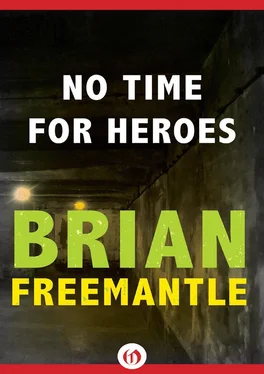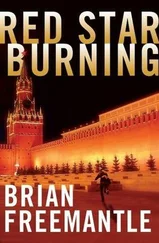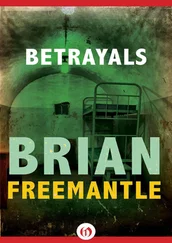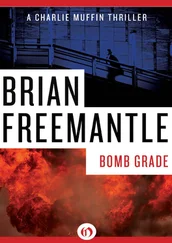Brian Freemantle - No Time for Heroes
Здесь есть возможность читать онлайн «Brian Freemantle - No Time for Heroes» весь текст электронной книги совершенно бесплатно (целиком полную версию без сокращений). В некоторых случаях можно слушать аудио, скачать через торрент в формате fb2 и присутствует краткое содержание. Жанр: Триллер, на английском языке. Описание произведения, (предисловие) а так же отзывы посетителей доступны на портале библиотеки ЛибКат.
- Название:No Time for Heroes
- Автор:
- Жанр:
- Год:неизвестен
- ISBN:нет данных
- Рейтинг книги:5 / 5. Голосов: 1
-
Избранное:Добавить в избранное
- Отзывы:
-
Ваша оценка:
- 100
- 1
- 2
- 3
- 4
- 5
No Time for Heroes: краткое содержание, описание и аннотация
Предлагаем к чтению аннотацию, описание, краткое содержание или предисловие (зависит от того, что написал сам автор книги «No Time for Heroes»). Если вы не нашли необходимую информацию о книге — напишите в комментариях, мы постараемся отыскать её.
No Time for Heroes — читать онлайн бесплатно полную книгу (весь текст) целиком
Ниже представлен текст книги, разбитый по страницам. Система сохранения места последней прочитанной страницы, позволяет с удобством читать онлайн бесплатно книгу «No Time for Heroes», без необходимости каждый раз заново искать на чём Вы остановились. Поставьте закладку, и сможете в любой момент перейти на страницу, на которой закончили чтение.
Интервал:
Закладка:
Cowley’s only potential awkwardness came with a series of persistent questions about whether he thought an accredited diplomat at a foreign embassy was involved in criminal activities. Cowley’s only reply, which echoed hollowly when he gave it, was that he had no reason to connect Petr Serov with any crime. The Director repeated it, for emphasis. That denial sounded hollow, too.
Back in the anteroom, afterwards, Rafferty said: ‘The only way left to get Danilov here if that fails is to send in a SWAT team to kidnap him!’
‘If they do respond but send a stooge, I guess we’ve got part of our answer, about collusion,’ said Ross, reflectively.
‘Then where are we?’ asked Cowley.
‘The same place as we are at the moment,’ said the Director. ‘Nowhere.’
The media coverage in Moscow was restricted in comparison to Washington only by the limitations of television channels and newspapers. The television at the Kirovskaya apartment faded halfway through the item, with Danilov’s face filling the screen, sending Olga into a screaming rage. The following morning Danilov stopped and bought all the papers, as he had when the murder of Serov occurred; on this occasion he was featured on all the front pages. He stored them in the boot, for Olga to read that night. When he got to Petrovka there were no mockery-intended copies on his cluttered desk. He’d been there an hour when the summons came from Metkin.
‘You have been ordered to the Interior Ministry,’ announced the Director. ‘We both have.’ The man stopped, rehearsing what he had to say. ‘Leonid Lapinsk committed suicide last night. Shot himself with his service revolver, which he hadn’t surrendered.’ Another pause. ‘Through the mouth: blew his head off.’
CHAPTER THIRTEEN
Danilov recognised the Federal Prosecutor, Nikolai Smolin, from previous encounters, but needed introductions to Vasili Oskin, the Deputy Interior Minister in whose office they convened, and to Sergei Vorobie, the Deputy Foreign Minister. He was refusing to anticipate anything about the summons or to believe any of the newspaper speculation.
It was difficult anyway to focus fully in these initial moments, after the intentional brutality of Metkin’s announcement. Danilov’s instant reaction had been pity, for a sad, totally disillusioned old man who’d despised himself as a failure. But just as quickly the doubt came, the doubt of a trained investigator. Had Lapinsk really been sad and disillusioned, deserving pity? Or was there some other reason for taking his own life – if indeed he had taken his own life? He wouldn’t be able to answer that sort of question until he’d at least read the full report. The preliminary, which Metkin had contemptuously shown him, had talked of clear-cut suicide. But there had been nothing to suggest a reason. He had to know why, before he could decide between pity and condemnation.
Danilov forced himself to concentrate. Lapinsk was dead, for whatever reason. He was alive, and without warning possibly propelled over the heads of his enemies. He had to take each and every advantage he could. An immediate impression was that Metkin’s attitude was too effusively respectful for any of these three officials to be the man’s unknown protector.
‘We have to discuss the murder in Washington,’ announced Oskin, a thin, balding, soft-voiced man. He looked briefly to the Foreign Ministry man before adding: ‘It has been escalated into a political matter that has to be properly handled.’
‘There’s been a formal diplomatic invitation – a request, in fact – for us to assist,’ said Vorobie. Danilov belatedly recognised him as one of the Russian ministers who had publicly denounced the 1991 coup from the steps of the Russian White House.
Oskin smiled briefly, towards Danilov. ‘Your earlier communication showed sensible foresight.’
Danilov ducked his head at the praise, wondering what Metkin would later say to whoever had put the newspapers in his office, if it had not been his own idea. Turning the head movement towards Metkin, he said adroitly: ‘We thought it was inevitably something which would extend to here.’
Metkin’s reaction was exactly what Danilov had hoped. ‘Absolutely inevitable. That’s why I suggested it.’
Keep on being over-eager, thought Danilov.
‘There’s been a request to speak to Serov’s wife,’ said Vorobie. ‘The Americans also want access to the embassy and to the man’s home, to which we cannot agree.’
‘Clearly not,’ agreed Metkin, trying to convey an opinion by following one already expressed.
Idiot, thought Danilov: it was the time and opportunity to illustrate the professional gulf between himself and the other man. Danilov said: ‘Apart from the access difficulty, are we going to take up the American approach?’
‘Yes,’ announced Smolin, entering the discussion. ‘There are several practical advantages, apart from the obvious.’
‘Aid being the most important,’ said Vorobie. ‘We can’t risk the financial assistance from Washington. This is, indeed, an ideal opportunity to demonstrate full collaboration, like we did when the American politician’s relation was murdered here.’
‘Can we afford to do that?’ asked Danilov quietly.
The question had precisely the effect he intended. All three officials frowned in bewilderment: Metkin’s head moved like a spectator at a tennis match. Danilov continued: ‘The published reports say Serov was killed American Mafia-style. The Swiss financier too. Was there any official connection between the two?’
There was a brief silence. Vorobie said: ‘We have a positive assurance from the ambassador that there was no official knowledge of any meeting. Or reason for one.’
To the Interior Ministry man Danilov said: ‘Was there any security reason for or knowledge of such an encounter?’
‘None,’ said Oskin at once.
‘So our contribution can be quite open?’ he persisted. Irrespective of any part he might or might not play, this was the moment when the rules were made.
‘The method of killing is peculiar,’ intruded Smolin. ‘I think that question is one that can only be answered as the enquiry proceeds.’
‘I agree,’ said Vorobie. He was a plump but neat man, his face partitioned by a moustache almost too heavy for his features. A diplomat of the new order, he had the habit of hesitating before any sentence, thinking ahead about what he was going to say.
‘It was an important point to raise,’ conceded Oskin.
‘We thought so,’ said Metkin, anxious to contribute.
If he hadn’t known Metkin’s intention to drive him from the Bureau, Danilov might have felt some pity for the inadequate man. The conversation was between him and the officials, Metkin coming close to being ignored. Determined to keep it that way, Danilov said: ‘Have the Americans been officially informed of our agreement?’
‘Later today,’ said Vorobie. ‘After the ambassador has delivered our Note, we will issue a press statement.’
‘There will be liaison between the two Bureaux in the first place,’ decided Oskin. ‘Close consultation between yourselves and the three of us. Priority will naturally be given to any facilities you may require.’
‘Vladimir Kabalin is the newly appointed senior colonel in charge of investigation,’ burst in Metkin. ‘He’s the officer to be assigned.’
‘What!’ said Oskin, face twisted beyond a frown in his surprise. Both Vorobie and the Federal Prosecutor looked similarly taken aback.
Metkin repeated Kabalin’s name but hesitantly, discerning the reaction.
‘Kabalin has no experience of joint international detective work, has he?’ asked Smolin.
‘No,’ admitted Metkin.
Читать дальшеИнтервал:
Закладка:
Похожие книги на «No Time for Heroes»
Представляем Вашему вниманию похожие книги на «No Time for Heroes» списком для выбора. Мы отобрали схожую по названию и смыслу литературу в надежде предоставить читателям больше вариантов отыскать новые, интересные, ещё непрочитанные произведения.
Обсуждение, отзывы о книге «No Time for Heroes» и просто собственные мнения читателей. Оставьте ваши комментарии, напишите, что Вы думаете о произведении, его смысле или главных героях. Укажите что конкретно понравилось, а что нет, и почему Вы так считаете.












